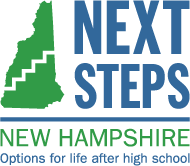
Next Steps NH is a federally-funded project designed to improve the capacity of schools and communities to improve the outcomes of youth with disabilities and youth at risk of failing high school. The project delivers evidence-supported transition practice training and technical supports to schools districts throughout the state.
Youth with disabilities drop out of high school at two-four times the rates of other students, and are employed, attend college, and live independently at rates far below young people without disabilities. High school is the time when young people should be preparing for post high school living, and youth with disabilities should be receiving additional services designed to help them transition successfully to adult life. Schools and communities should be providing evidence-based and best practices to all youth, however, the training and preparation of education, vocational, and community providers as well as parents is not able to able to do this.
Next Steps NH’s goal is to increase the number of students with disabilities and/or those at risk of dropping out of school who are college and career ready in New Hampshire through implementation of evidence based transition practices. Next Steps NH will focus on four strategies to achieve this goal:
- Increasing student competency through increased use of Extended Learning Opportunities (ELOs),
- Enhancing transition planning, activities and opportunities,
- Greater family-school engagement
- Sustaining practices through our state institutions of Higher Education (IHEs), regional professional development intermediaries, a transition Community of Practice, and the use of technology.
This project offers seven objectives designed to support these strategies:
- To develop the capacity of those providing professional development on Extended Learning Opportunities (ELOs), transition planning, and parent engagement, and to define the expectations and commitment of those receiving professional development.
- To increase and expand the use of ELOs in all regions of New Hampshire, by increasing the knowledge and skills of NH special and general educators, related service personnel, and administrators in the design, implementation with fidelity, and sustainability of evidence based ELOs.
- To increase the use of best practice, evidence-based transition planning, including enhanced family engagement strategies.
- To sustain the use of ELO, transition planning, and parent engagement strategies, through evidence-based and quality coaching.
- To increase the use of implementation, intervention, and outcome data to support decision making at the school, LEA, and state level.
- To ensure LEA administrators are trained to support their staff and initiatives to implement and sustain the use of ELOs, transition planning and family engagement strategies.
- To enhance the inclusion of evidence-based training materials on ELOs, transition planning, and parent/family engagement in IHE pre-service training programs to sustain delivery of grant services throughout the state.
The Institute on Disability will be working on addressing the need for better trained professionals, communities, and family members by providing a comprehensive model of community assessment, in services training and coaching, on-line training, and training for students in education and special education college programs. The IOD will also be using the RENEW model to target youth with emotional and behavioral disorders.
To learn more about the Next Steps NH Project, visit Next Steps NH.
Project Staff
- Heidi Cloutier
Project Director: MTSS-B & RENEW Trainer - Joanne Malloy
Research Associate Professor
Project Partners
- Vocational Rehabilitation
- Granite State Independent Living
- North Country Educational Services
- Monadnock Center for Successful Transitions
- Keene State College
- Strafford Learning Center
- Parent Information Center
- Q.E.D. Foundation
- Institute on Disability at the University of New Hampshire
- Evergreen Evaluation & Consulting
- New Hampshire Transition Community of Practice
News & Events
April 26, 2016: Check out the new resources for high school seniors on the Next Steps NH website!